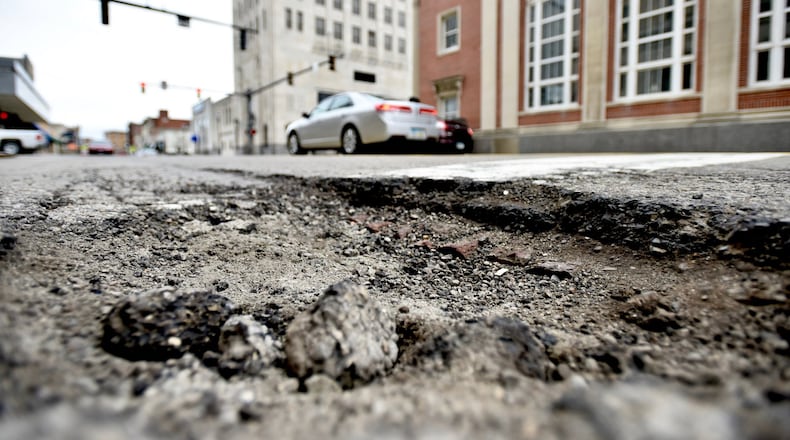The smallest new allocation, $1,298, will go to Jacksonburg’s coffers next year. The tax hike takes effect in July.
The passage is already have an impact on some communities’ plans for levies and fee increases in other areas.
Butler County Engineer Greg Wilkens informed the county commissioners earlier this year he would likely be asking them soon to increase vehicle license plate fees by $5. He estimated the fee would generate about $1.8 million, which would allow him to get his repaving cycle back on track. The county resurfaces roads it’s responsible for every 27 years, but Wilkens said the optimal street resurfacing cycle is every 17 years.
RELATED: The state’s transportation bill could have a big impact on Butler County. Find out why.
The gas tax hike won’t reap the total amount needed, but he said he is reconsidering the $5 fee increase.
“We’re going to give it some consideration,” Wilkens said. “We’ll just have to see how everything shakes out. It has a bearing no doubt on the license plate (fee hike). The need is going to be there, I’m still very concerned about inflationary factors. I don’t know what that’s going to be so we’re just going to watch and see.”
As a result of the revenue boost, the citizen’s committee leading the way on a road levy question for Hamilton voters next March say the request will drop by about one mill.
Jack Whalen told the Journal-News that the citizens’ campaign had a consensus during a recent meeting to reduce the levy from the previously announced 4.9 mills to about 3.9 mills.
“We said before we were going to consider that, and that was the thought process,” Whalen said. “It’s still not enough money” to do all the work that is needed on Hamilton’s streets, he said.
Likewise, an estimated $293,985 boost in gas taxes means Trenton officials will be asking for fewer property taxes from residents in November.
Last month the city council approved a resolution of necessity to ask voters for up to 6-mills in a temporary, five-year levy in the fall. Public Works Director Rob Leichman said he hasn’t had money in his budget for repaving in four years and the streets need about $5 million worth of work, or $1 million per year.
The gas tax hike is expected to bring collections up to $686,123, so Finance Director Mike Engel said he believes officials can reduce the millage significantly.
“We think it could be 4.5 mills, maybe less,” Engel said. “We’re running numbers still.”
He estimated 4.5 mills will bring in $780,000.
RELATED: Trenton asking voters for street levy after having ‘zero, zilch’ available for recent road repairs
Ross Twp. also considered asking residents to approve a road levy but back pedaled on taking that “drastic” step.
“Our roads are falling apart,” Trustee Tom Willsey said. “Obviously if we were going to do anything that drastic (ask for a levy) we’d go out and get the feel of the public and see what their take is on it. We’re not anywhere close to that kind of a decision.”
The $81,172 additional allocation of gas taxes won’t end future levy the discussions, according to Township Administrator Bob Bass, but the funds will be helpful.
“Every little bit helps,” Bass said. “It’s not going to do major projects for us, major rehabilitation or major reconstruction type of projects for us but it will do some maintenance projects. Crack sealing, pavement rejuvenation type of things maybe micro-sealing, but not the big ones.”
Middletown will collect approximately $996,044 more in gas taxes, making the city’s annual allocation around $2.6 million. Residents there will see street repairs ramp up.
“This funding increases the opportunity for additional paving and public works projects to take place over the next several years,” Public Works Director Scott Tadych said. “The Middletown community will definitely benefit from it.”
A study of the data by the Journal-News shows that the distribution will not be equal, even for similar communities. It is calculated in part on the number of vehicles registered in a given jurisdiction and road miles.
Hamilton and West Chester Twp. have roughly the same population at around 60,000. Hamilton has 237 center line miles and the township 220 center lane miles. But Hamilton will receive, $1.2 million, and West Chester will receive $483,164.
“I don’t think it’s fair and to me there is no logical reason why,” West Chester Trustee Board President Mark Welch said. “It bugs me.”
There are two “buckets” of money, according to Gary Gudmundson, spokesman for the Ohio Department of Taxation. Out of one, the municipalities pull in 43 percent, counties receive 37 percent and townships only reap 20 percent. Out of the other, counties get 9.3 percent, municipalities get 10.7 percent, townships receive 5 percent and the rest goes to the state.
“It was just a decision that was made along the way,” Gudmundson said.
Liberty Twp. will see an estimated $299,643 tax bump, bringing the total to $559,594. Trustee Tom Farrell said the inequity between the cities and townships is even more vexing since townships can’t collect income tax and many township roads are “in dire need of repair.”
“This will give us little bit of extra money to better serve the residents and make their streets are safe,” he said. “Without infrastructure, we don’t grow.”
About the Author
